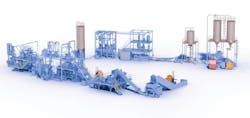Bottle-to-Bottle PET Recycling Plant Solution
Coperion and Herbold Meckesheim have collaborated and combined their technologies for the design and construction of entire PET bottle-to-bottle recycling plants.
In addition to the mechanical processing of used PET bottles, the recycling system encompasses all process steps leading up to extrusion with a ZSK twin screw extruder, including pelletizing and an SSP (Solid State Polycondensation) reactor.
The PET bottle recycling systems are designed for a throughput of 5,500 kg/h. They deliver PET recyclate that is approved by the European Food Safety Administration (EFSA) and the U.S. Food and Drug Administration (FDA) for direct contact with food.
Coperion's and Herbold Meckesheim's bottle-to-bottle plants enable all recyclates to be processed together, even if they exhibit different IV (Intrinsic Viscosity) values or fluctuating bulk densities. Additionally, the Coperion-Herbold solution saves on operating costs, logistics costs, and energy consumption in comparison to conventional PET recycling processes.
The bottle-to-bottle recycling system first processes the PET bottles into flakes. For this purpose, Herbold uses granulators with forced feeding and washing system technologies that efficiently and gently process the PET to minimize material loss due to fines formation and thus maximize yield.
This preprocessing is followed by conveying and feeding into the ZSK recycling twin screw extruder. There, the PET regrind is gently melted, intensively dispersed, and processed into a homogeneous mass. The ZSK’s twin screw technology efficiently transfers the energy into the melt. Thanks to the twin screw extruder’s high 18 Nm/cm³ torque, the PET’s residence time in the extruder is short. Processing takes place at low temperatures, polymer chain degradation is minimal, and the product quality achieved is high. Volatile components such as monomers, oligomers, and water are removed from the melt and purged.
Following discharge from the ZSK recycling extruder, the still-warm material stream is transferred via a gear pump to an underwater granulator and an SSP reactor, where it is then condensed and decontaminated.
Coperion and Herbold Meckesheim design plants for plastic recycling from mechanical pretreatment to finished pellets.
For more information, contact:
David Lefrancois, President, Herbold Meckesheim USA, Resource Recycling Systems Inc.
N. Smithfield, RI
Tel: (401) 597-5500
[email protected]
www.herboldusa.com
